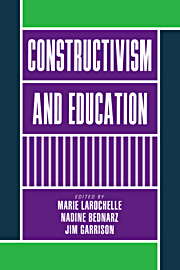Book contents
- Frontmatter
- Contents
- Preface
- List of contributors
- I Introduction
- II From epistemological constructivism to teaching: a variety of views
- III Teaching within the constructivist mode: practices and promises
- 5 Individual construction, mathematical acculturation, and the classroom community
- 6 The construction of answers to insoluble problems
- 7 Voice and perspective: hearing epistemological innovation in students' words
- 8 Constructivism-in-action: students examine their idea of science
- 9 Constructivism and ethical justification
- 10 Social studies, trivial constructivism, and the politics of social knowledge
- 11 Practical knowledge and school knowledge: a constructivist representation of education
- IV The mediating role of teachers and teacher education
- V Conclusion
- Notes
- References
- Index
11 - Practical knowledge and school knowledge: a constructivist representation of education
Published online by Cambridge University Press: 04 August 2010
- Frontmatter
- Contents
- Preface
- List of contributors
- I Introduction
- II From epistemological constructivism to teaching: a variety of views
- III Teaching within the constructivist mode: practices and promises
- 5 Individual construction, mathematical acculturation, and the classroom community
- 6 The construction of answers to insoluble problems
- 7 Voice and perspective: hearing epistemological innovation in students' words
- 8 Constructivism-in-action: students examine their idea of science
- 9 Constructivism and ethical justification
- 10 Social studies, trivial constructivism, and the politics of social knowledge
- 11 Practical knowledge and school knowledge: a constructivist representation of education
- IV The mediating role of teachers and teacher education
- V Conclusion
- Notes
- References
- Index
Summary
Constructivism as a general theory of education
It is customary to associate constructivism and theory of knowledge. That is probably one of the reasons why this approach in education has retained a cognitivist cast until now. Research has borne principally on the examination of the cognitive processes at work in intellectual development and the constraints operated by these not only on teaching but on learning particular school subjects. All the same, the import of constructivism for education is much greater than this. Research conducted in other contexts has provided clear illustration of how this approach holds promise for the pursuit of educational objectives other than those associated exclusively with cognitive development or schooling (see, for instance, Gergen, 1985, 1995; Mahoney and Lyddon, 1988; Watzlawick, 1988).
Such is the thesis of this chapter as well. I would like to show how the constructivist point of view makes it possible to develop a vision of the whole of educational phenomena which is comprehensive and penetrating and which, at the same time, is both viable and even fertile. This kind of vision would embrace education as much in terms of its psychological, developmental, socioaffective, and psychopedagogical aspects as of its cognitive and didactic aspects. By the same token, I would also like to show what occurs when the constructivist approach is widened to include all educational phenomena: It is possible at that point to contextualize and delimit application of the approach in relation to more specific problematics involved with schooling and teaching – two areas that, after all, form only a subset of the entire educational field.
- Type
- Chapter
- Information
- Constructivism and Education , pp. 173 - 192Publisher: Cambridge University PressPrint publication year: 1998
- 7
- Cited by



